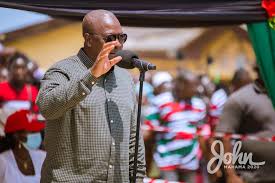The article discusses a parliamentary situation in Ghana involving Dr Dominic Akuritinga Ayine, MP for Bolgatanga East, and the National Democratic Congress (NDC). It mentions that the NDC plans to continue with parliamentary proceedings on Tuesday, October 22, even if members of the New Patriotic Party (NPP) boycott the session.
The article also highlights that NPP members, led by Alexander Afenyo-Markin, announced a conditional boycott of parliament after Speaker Alban Bagbin declared four seats vacant. Three of these seats are associated with the NPP and one with the NDC. This development has resulted in a leadership crisis, with the NDC claiming a majority in parliament. The article elaborates on the political situation in Ghana’s parliament. It confirms that the New Patriotic Party (NPP), led by Alexander Afenyo-Markin, announced a conditional boycott of the parliamentary session in response to Speaker Alban Bagbin’s decision to declare four parliamentary seats vacant. The declaration has significant implications for parliamentary dynamics, as three of the vacant seats were previously held by NPP members, while one belonged to the National Democratic Congress (NDC).
The situation has led to a leadership crisis in parliament, with the NDC, which was previously the minority, now claiming a majority due to the vacant seats. The article suggests that the NDC intends to take advantage of this shift to push forward with its legislative agenda. It further expands on the political developments in Ghana’s parliament. According to Dr Dominic Ayine, a “new regime” is set to begin on Tuesday when parliamentary sessions resume and the National Democratic Congress (NDC) plans to act in line with the will of the electorate. This includes potentially repealing certain laws, such as the Electronic Transfer Levy (commonly known as the e-Levy), which Dr Ayine identified as a likely target for repeal.
Dr Ayine also commented on the issue of parliamentary majority, asserting that the matter of who holds the majority is “as clear as daylight” based on numerical strength. He suggested that if certain issues only require a simple majority vote, the NDC would proceed with legislative business, even in the absence of NPP members. The NPP had stated they would return to the house only after the Supreme Court ruled on an injunction application concerning the Speaker’s decision. The 1.75% Electronic Transaction Levy (e-Levy) proposed in Ghana’s 2022 budget aimed to tax electronic transactions such as mobile money payments, bank transfers, and merchant payments. The government justified the levy as a means to generate revenue for infrastructure projects, reduce the national debt, and expand the tax base in a largely informal economy.
The opposition, led by the National Democratic Congress (NDC), argued that the e-Levy was regressive, disproportionately affecting low-income earners who rely on mobile money services for everyday transactions. Critics expressed concerns that the levy would increase the cost of living, discourage the use of digital financial services, and burden small businesses that depend on electronic transactions. The NDC also questioned the government’s decision to introduce the levy at a time when Ghanaians were already facing economic challenges, such as rising fuel prices and inflation.
As tensions mounted, Parliament became the focal point of the controversy. The debate over the budget and the e-Levy escalated, culminating in a dramatic parliamentary session on December 20, 2021. Attempts to vote on the e-Levy resulted in a chaotic scene, including a physical altercation between MPs from the ruling New Patriotic Party (NPP) and the NDC. The Speaker of Parliament, Alban Bagbin, left the chamber during the commotion, leading to a temporary suspension of proceedings.
The NDC accused the government of attempting to bypass established parliamentary procedures to push through the e-Levy without reaching a consensus. This impasse reflected broader concerns about the lack of transparency and inclusive decision-making in the legislative process. Despite the pushback, the government remained determined to implement the e-Levy, viewing it as essential for addressing fiscal challenges and funding national development initiatives.
The political standoff continued into 2022, with several adjustments and negotiations around the levy before it was eventually passed at a reduced rate of 1.5%. The introduction of the e-Levy and the parliamentary clashes highlighted the deep divisions in Ghanaian politics and the challenges of balancing revenue generation with public acceptance in policy-making.










